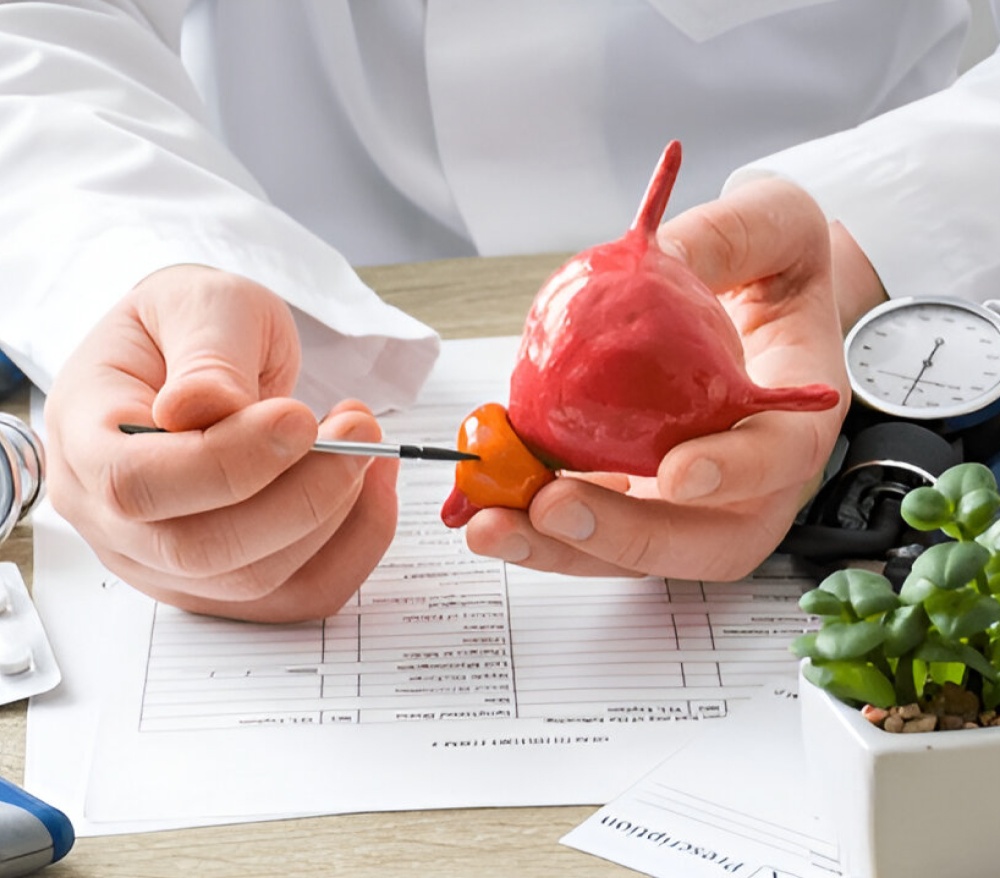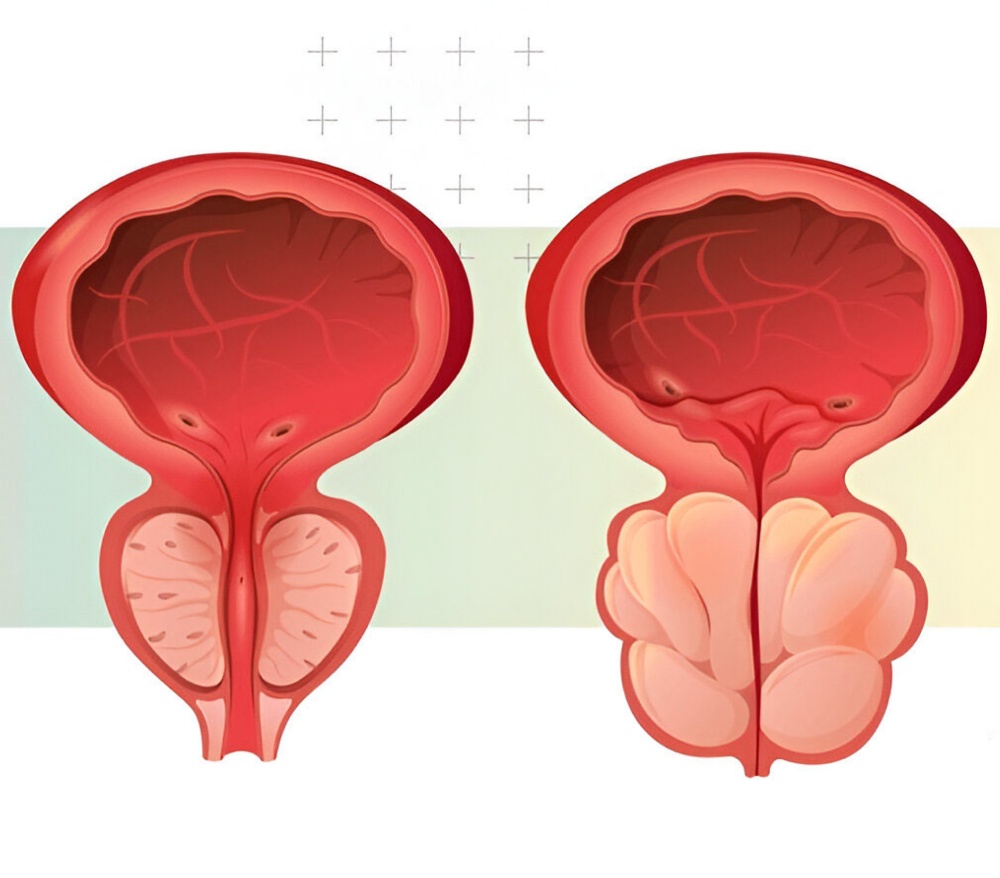Prostate Cancer Treatment in India
Prostate Cancer

Prostate Cancer: Symptoms, Diagnosis & Treatment
Prostate cancer is one of the most common cancers affecting men, especially those over the age of 50. The prostate is a walnut-sized gland in the male reproductive system, responsible for producing seminal fluid that nourishes and transports sperm.
While prostate cancer often grows slowly and may remain confined to the gland, some cases can be aggressive. Early detection and proper management can significantly improve outcomes.
What is Prostate Cancer?
Prostate cancer develops in the prostate gland, located just below the bladder and in front of the rectum. Most cases are adenocarcinomas, which originate in the glandular cells responsible for producing prostate fluid.
In many men, prostate cancer progresses slowly and may not cause symptoms for years. However, in more aggressive forms, the disease can spread quickly to bones and other organs.


Causes and Risk Factors of Prostate Cancer
While the exact cause is unknown, several risk factors have been identified:
- Age – Risk increases significantly after age 50.
- Family History – A close relative with prostate cancer increases your risk.
- Genetics – Inherited mutations in genes like BRCA1, BRCA2, and conditions like Lynch syndrome can raise risk.
- Obesity – Overweight men may have a higher risk and poorer treatment outcomes.
Symptoms of Prostate Cancer
Early-stage prostate cancer may not cause noticeable symptoms. As the disease progresses, symptoms may include:

Blood in Urine or Semen

Difficulty in urinating or Weak urine flow

Pelvic pain or discomfort during intercourse
Advanced symptoms (as cancer spreads):

Persistent pelvic or
lower back pain

Swelling in the legs

Pain or difficulty
during urination

Kidney complications or failure
If you experience any of these symptoms, it’s important to consult a healthcare provider promptly.
Types of Prostate Cancer
Most common prostate cancers are:
- Adenocarcinomas – The most common type, originating from the cells that make prostate fluid.
- Small Cell Carcinomas
- Neuroendocrine Tumors
- Sarcomas
- Transitional Cell Carcinomas
Precancerous Prostate Conditions
Prostate cancer may begin as a precancerous condition:
- Prostatic Intraepithelial Neoplasia (PIN)
- Low-grade PIN: Cells appear almost normal.
- High-grade PIN: Cells show abnormal features and are more likely to develop into cancer.
- Proliferative Inflammatory Atrophy (PIA)
- Prostate cells appear smaller and inflamed. PIA may increase the risk of high-grade PIN and prostate cancer.


Prostate Cancer Prevention
While not all cases are preventable, lifestyle changes may reduce your risk:
- Eat a healthy, balanced diet rich in fruits, vegetables, and whole grains.
- Exercise regularly and maintain a healthy weight.
- Avoid unnecessary supplements without medical advice.
- Get screened if you have a family history or genetic predisposition.
Potential Side Effects of Prostate Cancer Treatment
Treatment can affect quality of life. Common side effects include:
- Urinary incontinence
- Erectile dysfunction
- Fatigue
- Bowel changes
Your doctor will discuss the risks and help manage side effects with supportive therapies and rehabilitation.
Prostate cancer is highly treatable, especially when detected early. Men over 50, or those with risk factors, should prioritize regular screening. At Thangam Hospital, our expert oncology team provides personalized, evidence-based care using the latest advancements in surgery, radiation, hormone therapy, and targeted treatments.


Screening and Diagnosis of Prostate Cancer
1. PSA Blood Test (Prostate-Specific Antigen)
Measures PSA levels in the blood. Elevated PSA can suggest cancer, but also may indicate benign conditions like prostatitis or BPH.
2. Digital Rectal Exam (DRE)
A gloved, lubricated finger is inserted into the rectum to feel for abnormal prostate size, texture, or shape.
3. Biopsy
A needle biopsy collects a tissue sample for analysis under a microscope to confirm cancer.
4. Imaging Tests
- MRI – Provides detailed images to assess tumor extent.
- CT Scan – Checks for spread to nearby lymph nodes.
- Bone Scan – Detects spread to bones in advanced stages.
Treatment Options for Prostate Cancer
Treatment is personalized based on the cancer’s stage, aggressiveness, and the patient’s health.
Recommended for low-risk cancers with slow progression. Includes regular PSA tests, exams, and imaging.
Removal of the prostate gland, either via open or minimally invasive laparoscopic/robotic techniques.
- External Beam Radiation Therapy (EBRT): High-energy X-rays target cancer.
- Brachytherapy: Radioactive seeds implanted directly into the prostate.
- Conformal Radiation Therapy: Precisely targets the tumor while sparing healthy tissue.
Reduces male hormones (testosterone and DHT) that fuel cancer growth. Used in intermediate to advanced stages.
Systemic treatment that uses anti-cancer drugs to destroy fast-growing cancer cells. Often used in advanced or hormone-resistant cases.
Used for patients with specific genetic mutations (e.g., BRCA1/2). Targets cancer cells more precisely with fewer side effects.
Stimulates the body’s immune system to recognize and attack cancer cells. Used in select advanced-stage cases.



